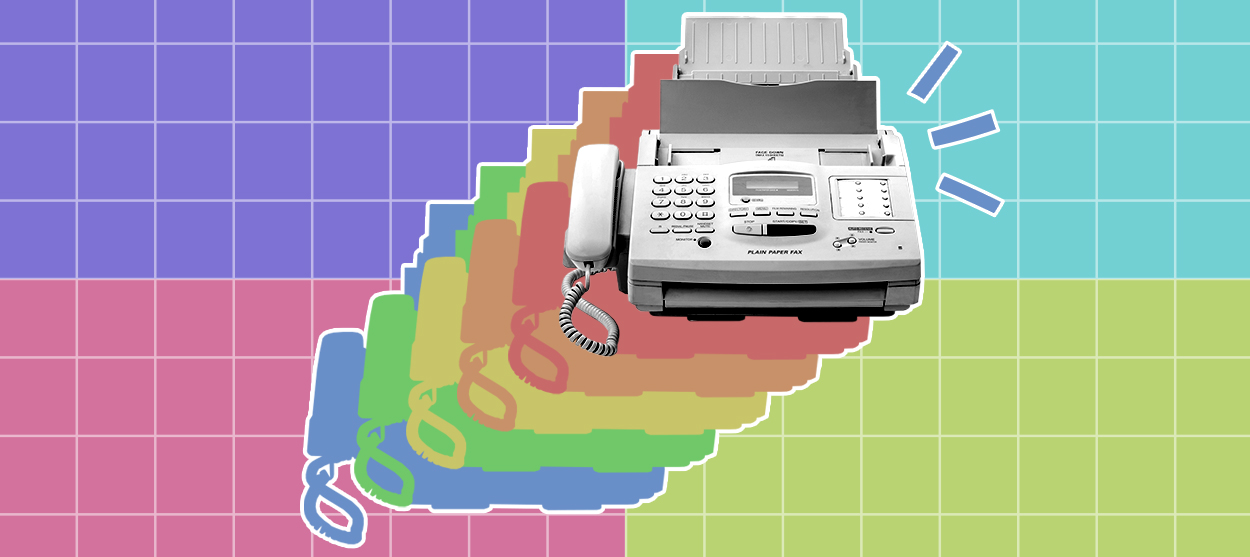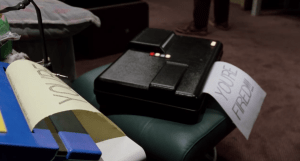Fax machines. Hear me out.
Just think of them as retro Snapchat


A free daily email with the biggest news stories of the day – and the best features from TheWeek.com
You are now subscribed
Your newsletter sign-up was successful
Fax machines and dinosaurs have become colloquially interchangeable.
The U.S. Postal Service is either "as crucial as ever, or it's about to go the way of the fax machine." An Australian columnist warns that "retirement will disappear like the fax machine." Wonders The Guardian, "Should the current model of education go the way of the fax machine?" It's as if fax machines were obliterated by an asteroid in a mass technological extinction event in 1999; they're as relevant as a Triceratops.
Which is sad. Fax machines are great — and we should bring them back.
The Week
Escape your echo chamber. Get the facts behind the news, plus analysis from multiple perspectives.

Sign up for The Week's Free Newsletters
From our morning news briefing to a weekly Good News Newsletter, get the best of The Week delivered directly to your inbox.
From our morning news briefing to a weekly Good News Newsletter, get the best of The Week delivered directly to your inbox.
I'm not saying we need to throw our iPhones into the ocean and go back to living like it's 1990. I'm thankful I can send more than one photo in an email, and for an internet connection that I can use at the same time I'm on the phone (look that one up, kids).
What I'm saying is, why not also the fax machine? Despite being the original digital natives, millennials love old technology. We buy vinyl and cassette tapes and Polaroid cameras and typewriters. Sales of Nintendo 64s, a gaming console that hasn't been new since 1996, spiked 205 percent on eBay in 2018. Even landlines and VHS tapes are making a comeback. So where's the love for this baby?

The fax machine was cutting edge not all that long ago. Although the device was invented in 1846 — it was adorably called the "electric printing telegraph" — the version we're familiar with now wasn't brought to market until 1964 and didn't become omnipresent till the '80s. By 1989, the machine was such a fixture, notes Gizmodo, that even the creators of the movie Back to the Future Part II figured Marty McFly would be fired by his boss via a fax in the then-distant future of 2015.

A free daily email with the biggest news stories of the day – and the best features from TheWeek.com
The utility of fax machines waned over time as technology advanced, but they're actually not totally obsolete yet. In Japan, a third of all households still have one. Even in the U.S., doctor's offices still commonly fax medical records as a means of securely observing the strict HIPAA privacy rules. Say what you want about the fax, but it's difficult to hack: "[T]he HHS website explicitly names fax as an acceptable method of transmission of medical records," Slate writes, while some interpret the wording to imply that "email is not."
Still, I'm not endorsing bringing back fax machines in any practical way. There are better methods for sending and receiving images and documents, and anyone whose work still relies on the ancient technology will tell you that the machines are a pain to deal with. It's telling that Houston's football staff went full Office Space on their fax machine when given the opportunity in 2016.
But we should bring back fax machines the same way we've revamped other retro-cool tech. Take, for instance, Dispo, a new photo-sharing app that replicates the experience of shooting on a disposable camera by delaying the "development" of the images on your phone until the next day, thereby recreating that old-school sense of anticipation.
Why not turn fax machines into a similar way to delay gratification? Just watch the awesome scene in Michael Mann's 1999 film The Insider, when Al Pacino's journalist and Russell Crowe's whistleblower exchange a nail-biting communication with each other via handwritten, faxed messages. It's thrilling stuff! And that poorly-rendered black-and-white print-out is an aesthetic, okay?
Just think of the fax machine as retro Snapchat. Instead of a gentle ping alerting you to a message on your phone, you're summoned to a new communiqué by EEEEEEEE-ERMERMERMERM-ZZZZZZZZZZZZZ. There's something magical about watching a message slowly appear one inch at a time as the printer groans into action. Plus, the messages and images are instant keepsakes: A fax machine produces love letters that can be stashed away, or reminders that can be pinned up, or doodles and notes from friends that you can carry around with your Polaroids. The fax machine's analog output is almost a form of physical contact, one that becomes more valuable when we're living life increasingly far apart — even if it, alas, still falls short of sending actual objects.

Not all old technology gets a second life on the nostalgia market, and perhaps not all old technology should (though stay tuned for next week, when I defend the microfiche!). There will be plenty of naysayers, I'm sure, who will argue that the fax machine was a lousy piece of equipment and ought to stay dead.
But I say, the fax machine deserves better than to be relegated to the ash heap of history, along with the T-Rex and bloodletting and slide projectors. Hey, don't laugh! If center parts and disco are cool again, then anything is possible.
Jeva Lange was the executive editor at TheWeek.com. She formerly served as The Week's deputy editor and culture critic. She is also a contributor to Screen Slate, and her writing has appeared in The New York Daily News, The Awl, Vice, and Gothamist, among other publications. Jeva lives in New York City. Follow her on Twitter.
-
 What is the endgame in the DHS shutdown?
What is the endgame in the DHS shutdown?Today’s Big Question Democrats want to rein in ICE’s immigration crackdown
-
 ‘Poor time management isn’t just an inconvenience’
‘Poor time management isn’t just an inconvenience’Instant Opinion Opinion, comment and editorials of the day
-
 Bad Bunny’s Super Bowl: A win for unity
Bad Bunny’s Super Bowl: A win for unityFeature The global superstar's halftime show was a celebration for everyone to enjoy
